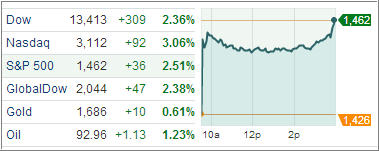Sure, the much feared slide down the fiscal cliff was avoided at the last minute, but the euphoric relief rally in the markets will likely be temporary in nature. Last time the S&P 500 gained some 60 points in 2 trading days, over 70% of it was given back within the next week.
Upon closer inspection of the last minute deal, and as was to be expected, the serious issues like budget cuts, were simply ignored. This watered down bare bones agreement will raise taxes for some 70% of the population and benefit maybe 20% of them.
In other words, the insanity continues, as we’re now heading towards the debt ceiling talks, which will have to be finalized by sometime in March, since we already have pierced the ceiling on the last day of 2012. The $15 billion or so allocated to debt reduction is nothing more than a joke when considering the fact that we are spending $1 trillion a year more than we are taking in.
As a consequence, that cliff deal had no meat anywhere and, absent serious reconsideration, the next generation(s) will be chewing on a bare bone attempting to pay off insurmountable debt.
Yes, that was my rant on the issue, but the indexes did not care and raced higher as the chart above shows with the S&P 500 Index posting its biggest single-session gain in more than a year.
The measure approved by the House of Representatives Tuesday undid income tax increases for a large percentage of households, as Democrats and Republicans made last-minute concessions to prevent more than $600 billion in spending cuts and tax hikes, but it isn’t the grand-bargain on deficit reduction lawmakers wanted, nor is it a mini bargain.
Rather it avoids the immediate trauma and marks only one step towards restricting the federal deficit by kicking the can down the road again, an issue that will return with a February fight over raising the $16.4 trillion debt ceiling.
Treasury prices fell, pushing the benchmark 10-year yields to their highest level in more than two months as demand for safer assets declined following a deal in Washington that would extend lower tax-rates for most Americans.
The US dollar edged up against the euro, but stayed higher versus the Japanese yen as forex markets seemed much less enthused than equities after the budget deal. The budget package passed by the Congress doesn’t do enough to avert a sovereign rating downgrade, Moody’s Investors Service warned today.
The deal fails to “provide a basis for a meaningful improvement in the government’s debt ratios over the medium term… Lack of further deficit reduction measures could affect the rating negatively,” the ratings agency observed.
Meanwhile, European stocks posted wide gains Wednesday as investors returning from the New Year’s break cheered the US budget deal that could potentially push the world’s largest economy into recession.
In the ETF space, stocks linked to the US tech sector leapt following the sector’s sterling performance today. The tech-heavy NASDAQ ETF (QQQ) led the gains with a 3.18 percent rise.
The SPDR S&P China ETF (GXC) also surged, adding 3.08 percent in the first session of the year after Chinese manufacturing showed expansion in December, albeit at a slower rate.
Both Trend Tracking Indexes (TTI) headed deeper into bullish territory and are now positioned as follows:
Domestic TTI: +2.63%
International TTI: +9.39%
Contact Ulli
